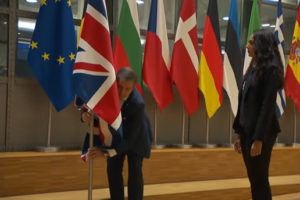 This article was originally written at the start of 2020, but it gives a perspective on why Brexit supporters are not (yet) switching away from support for Brexit, even with the threat of no deal — or a very bad one (and why they don’t seem to share others’ horror at the Internal Market bill, even though this breaks what the British Government agreed last autumn and presented to the electorate as an “overn-ready deal” in the 2019 General Election, runs foul of our commitments under international law and has led the EU to begin legal action.
This article was originally written at the start of 2020, but it gives a perspective on why Brexit supporters are not (yet) switching away from support for Brexit, even with the threat of no deal — or a very bad one (and why they don’t seem to share others’ horror at the Internal Market bill, even though this breaks what the British Government agreed last autumn and presented to the electorate as an “overn-ready deal” in the 2019 General Election, runs foul of our commitments under international law and has led the EU to begin legal action.
No deal
A “No deal” Brexit would mean leaving the EU without the benefits of any of the trade deals the UK currently enjoys. The UK would immediately face tariffs on international trade, major disruption along the border with the Republic of Ireland, and significant damage to all the businesses currently using just-in-time delivery chains that cross borders. Failure to recognise its seriousness make it easier for supporters of Brexit to dismiss any adverse predictions as “project fear” and fuels the claims of people like Nigel Farage, that the softer forms of Brexit are “Brexit in name only”. Both introduce an unhelpful level of unreality into the process around Brexit.
The evidence
In February 2019 a Yougov poll suggested that just 4% of people actually think “no deal” means “Remain in the EU”, implying that the problem is minimal.
But a Yougov poll of voting intentions on a second referendum taken 14–15 March 2019 found that 61% would choose to remain in the EU against 39% wanting to leave with the deal negotiated by the government. But choosing between remaining and leaving with no deal, “remain” had 58% support to 44% for “no deal”.
If people see “no deal” as a more extreme form of Brexit than the government’s deal, then support for “remain” would be expected to be greater when “no deal” is the other option. The discrepancy suggests either that some people see “no deal” as the same as “remain”, or think that the government’s deal is so bad that, when the “no deal” is removed, they prefer to abandon Brexit altogether (which seems unlikely).
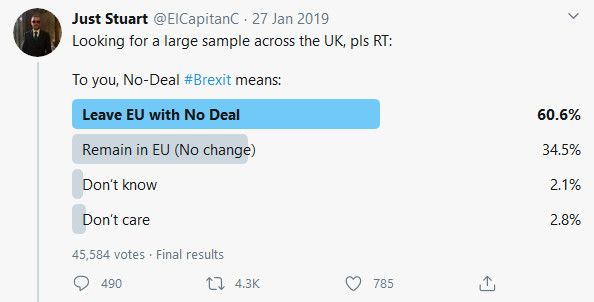
On 13 February 2012 @sturdyalex tweeted:
“On @BBCNews, Conservative MP @GillianKeegan: ‘The PM cannot take no-deal off the table or there’d be nothing on the table. I worked as a negotiator for many years. The status quo must be on the table.’ Excuse me, oh Master Negotiator, but no-deal is not the status quo. Remain is.”
In a twitter message, @sturdyalex confirmed that this was in the BBC 24 hour news, so there isn’t a written source, but Keegan herself joined in that thread and didn’t dispute the quote, instead trying to justify it by claiming that the (then) default position would have been “no deal” if nothing had been agreed by 29 March 2019.
This reads as somewhere between a genuine belief that “no deal” is the same as carrying on as things were (in February 2019) and another example of thinking around this being really difficult.
This is not to say that everyone thinks that “no deal” means “no change”, but both that there are enough people in this place to cause concern, and that there is something going on to make thinking difficult
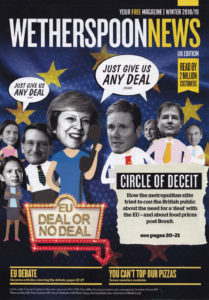 What draws these threads together is an advertising magazine put out by Wetherspoons pub chain which came through my door at around this time. Ostensibly advertising the pub chain, much of its content was around Brexit. There were photos of politicians looking timid and speech bubbles of “give us a deal, any deal”, with signage linking this to Noel Edmonds TV game show “Deal or no deal” where contestants guess the value of the contents of a box — if they “deal” they accept an offer for its (unknown) value, but if they choose “no deal” they are holding on to what they have already won, and demanding more.
What draws these threads together is an advertising magazine put out by Wetherspoons pub chain which came through my door at around this time. Ostensibly advertising the pub chain, much of its content was around Brexit. There were photos of politicians looking timid and speech bubbles of “give us a deal, any deal”, with signage linking this to Noel Edmonds TV game show “Deal or no deal” where contestants guess the value of the contents of a box — if they “deal” they accept an offer for its (unknown) value, but if they choose “no deal” they are holding on to what they have already won, and demanding more.
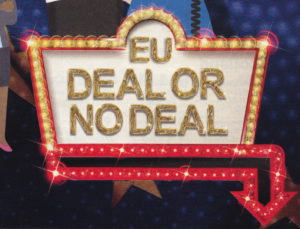 The implication is that going for “no deal” is to keep what we have and proceed with confidence. At one level, a TV game show is irrelevant to Brexit, except that the phrase “no deal” has the same implication of hanging on to what one has, and confidently expecting something better in the present round. This has strong echoes of the often repeated claim that “The EU needs us more than we need them”, with the assertion that we should say “no” in order to get a better deal. Economic reality doesn’t fit that description.
The implication is that going for “no deal” is to keep what we have and proceed with confidence. At one level, a TV game show is irrelevant to Brexit, except that the phrase “no deal” has the same implication of hanging on to what one has, and confidently expecting something better in the present round. This has strong echoes of the often repeated claim that “The EU needs us more than we need them”, with the assertion that we should say “no” in order to get a better deal. Economic reality doesn’t fit that description.
Running these together, it seems that there are grounds for thinking that some see “no deal” as meaning “no change”, and that, by early 2019, thinking around this had become really difficult.
The EU as a threat to be rejected
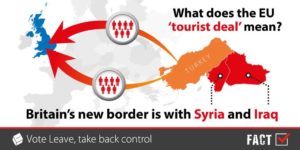 A second layer to this comes from what, at first sight, seem to be wildly exaggerated fears of what the EU might do, which might themselves make sense in terms of thinking being difficult. At the time of the referendum this was already appearing as fears of the future, which could be pushed away by voting “Leave”. The most startling of these was spurious the claim that the Turkey was about to join the EU, leading to a large level of immigration from Turkey and also Syria, to the UK.
A second layer to this comes from what, at first sight, seem to be wildly exaggerated fears of what the EU might do, which might themselves make sense in terms of thinking being difficult. At the time of the referendum this was already appearing as fears of the future, which could be pushed away by voting “Leave”. The most startling of these was spurious the claim that the Turkey was about to join the EU, leading to a large level of immigration from Turkey and also Syria, to the UK.
Generalising is difficult because evidence from doorstep conversations and social media is that there’s a wide range of views, so pulling them together is primarily about articulating the range. But as a few snapshots of what is around:
- There’s been persistent speculation about a “European army” written in terms that see this as hostile force. The reality is that Europe is under pressure over defence because of Donald Trump complaining that we are not paying enough. EU nations collective spending on defence ($264bn in 2019) is a little under half that of the US ($643bn in 2019) yet achieves less because that is spread across the armed forces of 28 nations. The idea of a European army is that a more-integrated defence force makes this spending go further. Among EU nations, Austria, Ireland, Finland, Malta and Sweden all commitments to neutrality and Germany has tight limits on how its armed forces can be used. This means it’s impossible for a European Army to be anything other than defensive. Yet this is spoken of as if this is a threat that could turn into an invasion of the UK.
- The 2007 Lisbon Treaty came into force in 2009, yet there have been persistent claims that sinister aspects will start soon (the most common claim is that it will force the UK to accept the Euro and membership of the Schengen Zone). There’s no substance in these claims, but their extent can be inferred from the comprehensive rebuttal put out by Fullfact.
Comments from individuals add to these snapshots:
- @MarianneVelvart (5 March 2019) posted, “Just as thick as the Leave voter who bought a pasty the day after the ref and said to the guy behind the counter ‘good we won or I couldn’t have bought these once the EU banned them!’” (implying a fear that the EU will be encroaching on people in the UK)
- @iainmartin1 (21 March 2019): “Anyone finding the whole EU27 grilling UK PM then deciding the fate of Britain behind closed doors thing making you feel really no deal.” (seemingly-defiant comment in response to the idea of the EU27 discussing their side of Brexit negotiations without include the UK)
- @hill93556859 (5 April 2019) “War is wholly appropriate. This is a direct conflict between the electorate who voted leave & the politic elite who wish to remain. Remain have set out their stall to destroy brexit, not compromise on it. Therefore the end game is we win full brexit or lose & remain in the EU.” (No suggestion here that anything is gained or changed by leaving)
- Andrew Bridgen MP in a television interview (11 September 2019) blamed the EU for problems over medicines at border in the event of “no deal”, talking in terms of “no deal” as a defiant resistance.
Why do people believe it
Earlier I referred to thinking having become difficult. Post-truth politics isn’t simply a matter of people lying and getting away with it. There’s a more serious erosion of truth as a concept. One psychoanalytic approach would be to suggest that people believe what meets their unconscious needs, which makes those needs central, but, as they are unconscious, they are also not available to talk about directly. One of the Lacan’s psychoanalytic insights is that people think in language, but this doesn’t always work as expected. Crucially, at a time of rapid change, familiar ways of thinking don’t necessarily work as they used to, which leaves people short of the frameworks round which to make sense of their world. That sounds a little abstract, but at the moment the West is living with a profound change as China and India emerge as major powers (which, for the British, includes being overtaken by the former colony of India). We’re living with technology re-shaping our lives — including serious concerns about the impact of social media on elections — and struggling to engage with the crisis of climate change.
One way to respond to something that brings anxiety but is also hard to think about is to deny it. In the psychoanalytic world that’s sometimes spoken of as disavowal — an active denying of something. Climate change is a good example of this as the evidence has been with us for a long time. Denying it isn’t simple forgetfulness or ignorance. If one piece of reality is being denied in this way, how can people tell which other ones should be taken seriously. Nigel Farage is on record as claiming that climate change is a “scam intended to bring forward transnational government” and is far from being the only person who argues for Brexit and denies climate change.
A proud rejection of all these changes under the guise of “No deal”, meaning “make it all go away” is an understandable and an appealing response which comes out of this place of disavowal. But this doesn’t solve the problem: it just offers a temporary respite from the anxiety. It’s no wonder that the idea of Brexit in general, and “no deal” in particular, makes thinking difficult.